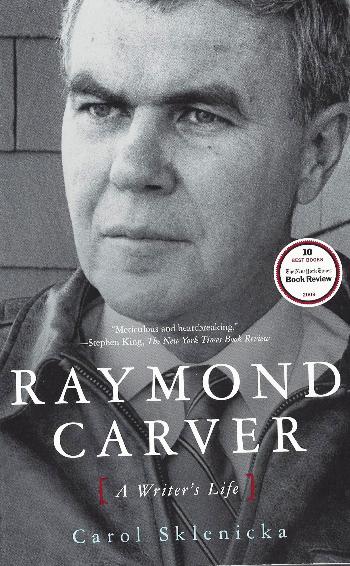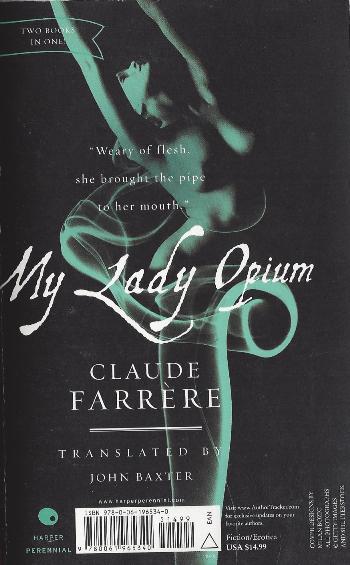|
 
Tiểu sử RC
& Cô Ba của Gấu
Mới tậu, hàng qua tay [second-hand]:
Thằng chả sống
ở đâu đó, giữa mộng và thực
“He lived in
a state somewhere between reality and a dream”
Luơng tri biểu
chúng ta, những sự vật trên thế gian này chỉ hiện hữu tí ti, và cái
thực
tại thực
thì chỉ ở trong mộng.
“Common
sense tell us that the things of the earth exist only a little, and
that true
reality is only in dreams”
Charles
Baudelaire
Dedication of Les Paradis Artificiels (1860)
RC ngỏm vì
rượu, hầu hạ Cô Ba của Gấu, cũng đặng!
Một câu thật
tuyệt của RC, trong Sổ Tay:
“Tớ đếch biết
tớ muốn cái gì, nhưng mà lúc này tớ muốn nó, I don’t know what I want,
but I
want it now”.
Còn 1 cái tít
của 1 chương sách trong tiểu sử RC, tặng Sông
của NNT, thì thật là tuyệt, tuy chưa đọc Sông, nhưng đọc điểm Sông:
Where Water Comes Together
with Other
Water:
Nơi Nước Quần Tụ, và Quần Tụ với Nước Khác
Hay là chơi
luôn cái tít của Thảo Trần, Nơi Dòng Sông
Chảy Về Phía Nam!
RAYMOND
CARVER
1938-1988
Raymond
Carver was one of the best-known American short-story writers, but also
an
excellent poet. Death from cancer interrupted his work at a moment of
full development,
after he had overcome his alcoholism. I couldn't read this poem on
Alexander
the Great without thinking of his biography, to which, besides, he
refers
WINE
Reading a
life of Alexander the Great,
Alexander whose rough father, Philip, hired Aristotle
to tutor
the young scion and warrior, to put some polish
on his smooth
shoulders. Alexander who, later,
on the campaign trail into Persia, carried a
copy of
The Iliad in a velvet-lined
box, he loved that book so
much. He loved to fight and drink, too.
I came to
that place in the life where Alexander, after
a long night of carousing, a
wine-drunk (the worst kind of drunk-
hangovers you don't forget), threw the
first brand
to start a fire that burned Persepolis, capital of the Persian Empire
(ancient even in Alexander's day).
Razed it
right to the ground. Later, of course,
next morning-maybe even while the fire
roared-he was
remorseful. But nothing like the remorse felt
the next evening
when, during a disagreement that turned ugly
and, on Alexander’s part,
overbearing, his face flushed
from too many bowls of uncut wine, Alexander rose
drunkenly to
his feet,
grabbed a spear and drove it through the breast
of his
friend, Cletus, who'd saved his life at Granicus.
For three
days Alexander mourned. Wept. Refused food. "Refused
to see to his bodily
needs." He even promised
to give up wine forever.
(I've heard
such promises and the lamentations that go with them.)
Needless to
say, life for the army carne to a full stop
as Alexander gave himself over to
his grief.
But at the
end of those three days, the fearsome heat
beginning to take its toll on the.
body of his dead friend,
Alexander was persuaded to take action. Pulling
himself together
and leaving his tent, he took out his copy of Homer, untied
it,
began to turn the pages. Finally he gave orders that the funeral
rites
described for Patroklos be followed to the letter:
he wanted Cletus to have the
biggest possible send-off.
And when the pyre was burning and the bowls of wine
were
passed his way during the ceremony? Of course, what do you
think?
Alexander drank his fill and passed
out. He had to be carried to his tent. He
had to be lifted, to be put
into his bed.
Thơ Mỗi Ngày
RAYMOND CARVER
1938-1988
The most classical poem of
nonattachment is that
of a sudden realization, in a flash, of the shortness of the time one
has left
to live.
Czeslaw Milosz
Bài thơ cổ điển nhất, về sự tách rời, đếch dính vào cái gì nữa, là về
cái phút
bất thình lình ngộ ra, về tí mẩu thời gian còn lại, và sau đó là ngỏm,
của 1
con người.
THE COBWEB
A few minutes ago, I stepped
onto the deck
of the house. From there I could see and hear the water,
and everything that's happened to me all these years.
It was hot and still. The tide was out.
No birds sang. As I leaned against the railing
a cobweb touched my forehead.
It caught in my hair. No one can blame me that I turned
and went inside. There was no wind. The sea was
dead calm. I hung the cobweb from the lampshade.
Where I watch it shudder now and then when my breath
touches it. A fine thread. Intricate.
Before long, before anyone realizes,
I'll be gone from here.
Sợi tơ nhện
Vài phút trước đó, tôi đứng
trước hiên nhà
Từ đó, tôi nhìn trời nước
và tất cả những gì đã xẩy đến với tôi trong tất cả những năm tháng đó.
Trời nóng, tĩnh mịch
Con nước xuống
Không tiếng chim
Khi tôi tựa vào bao lơn
Trán tôi dụng vô 1 sợi tơ nhện
Và nó vướng vào tóc tôi
Chẳng ai có thể trách tôi nếu tôi quay vô bên trong nhà.
Không một chút gió.
Biển chết lặng.
Tôi treo sợi tơ nhện vào cái chao đèn
Và tôi ngắm nó run rẩy, rùng mình, mỗi khi hơi thở của tôi đụng nó.
Sợi tơ nhện mới nhỏ, mịn làm sao. Rối vào nhau.
Lâu, thật lâu, trước khi 1 người nào đó nhận ra.
Tôi đi mẹ từ đời nào,
Ra khỏi cuộc đời này.
RAYMOND
CARVER
1938-1988
Just before
daybreak, when it is still dark, an electrical blackout causes the
speaker to look
outside at the landscape, which appears extraordinarily calm. The
speaker feels pure
inside at that moment. Later the same morning, electricity is restored
and "things
stood as they had before."
Czeslaw
Milosz
Trước bình
minh chỉ 1 tị, khi trời đất còn tối hù, một cú mất điện xẩy ra, khiến
cái tay
phát ngôn viên trong bài thơ dưới đây, nhìn ra bên ngoài, và phong cảnh
làm chàng
sững sờ: nó thinh lặng một cách lạ thường. Và chàng cảm thấy bên trong
chàng mới
thanh tẩy làm sao. Sau đó, cũng buổi sáng đó, có điện lại, và thế gian
lại “vũ
như cẩn”.
THE WINDOW
A storm blew
in last night and, knocked out
the
electricity. When I looked
through the
window, the trees were translucent.
Bent and
covered with rime. A vast calm
layover the
countryside.
I knew
better. But at that moment
I felt I'd
never in my life made any
false
promises, nor committed
so much as
one indecent act. My thoughts
were
virtuous. Later on that morning,
of course,
electricity was restored.
The sun
moved from behind the clouds,
melting the
hoarfrost.
And things
stood as they had before.
Cửa sổ
Một trận bão
hoành hành đêm qua và làm mất điện.
Khi tôi nhìn ra cửa sổ, cây cối thật u minh.
Ngã gục, ngổn
ngang, phủ đầy sương muối
Một cơn
thinh lặng trùm lên tất cả
Tôi biết hơn
thế, bảnh hơn thế.
Nhưng vào lúc
đó,
Tôi cảm thấy
mình trong đời chưa từng giả đò, hứa nhảm,
Chưa từng làm một hành
động bửn.
Tư tưởng của
tôi thì thật là thánh thiện
Sau đó một lát,
lẽ dĩ nhiên, điện có lại
Mặt trời
chui ra khỏi những đám mây
Làm tan lớp
sương muối
Và mọi chuyện lại như cũ
Czeslaw
Milosz, trong tuyển tập thơ quốc tế của
ông, A Book of Liminous Things,
chọn hai bài của RC, đều thần sầu, và đều
nói đến giây phút đốn ngộ.
Một đốn ngộ chết, và một, sống.
Bài sau đây, thì Gấu chọn, trong 1 bài viết trên tờ NYRB, bây giờ
không
làm sao kiếm ra nguyên tác tiếng Anh, chán thế!
Chiều tối
Tôi câu cá 1
mình
vào buổi chiều
tối mùa thu tiều tụy đó,
Màn đêm cứ
thế mò ra.
Cảm thấy,
mất mát ơi
là mất mát
và rồi,
vui ơi là
vui,
khi tóm được
một chú cá hồi bạc,
mời chú lên
thuyền
nhúng 1 cái
lưới bên dưới chú.
Trái tim bí
mật!
Khi tôi nhìn
xuống làn nước xao động,
nhìn lên đường viền đen đen của
rặng núi
phiá sau
thành phố,
chẳng thấy gợi
lên một điều gì,
và rồi
tôi mới đau
đớn làm sao,
giả như sự
chờ mong dài này,
lại trở lại
một lần nữa,
trước khi
tôi chết.
Xa cách mọi
chuyện
Xa cả chính
tôi
|


